29+ Sample Audit Proposals
-
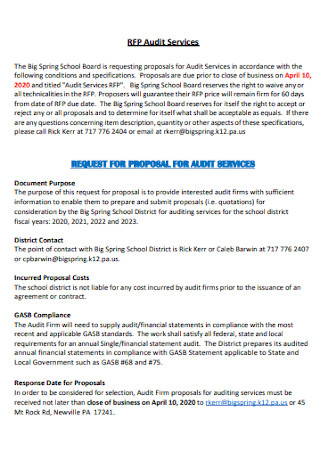
Audit Service Proposal
download now -
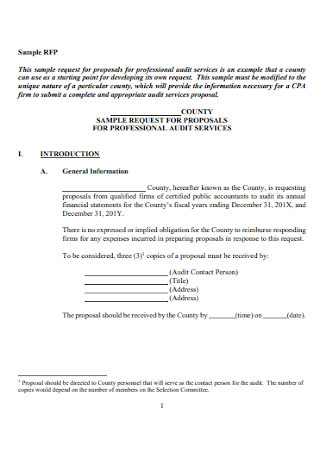
Office Audit Proposal Template
download now -
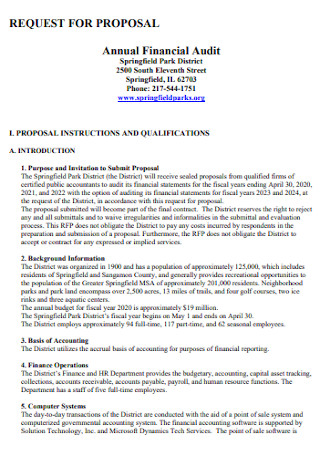
Annual Financial Audit Proposal
download now -
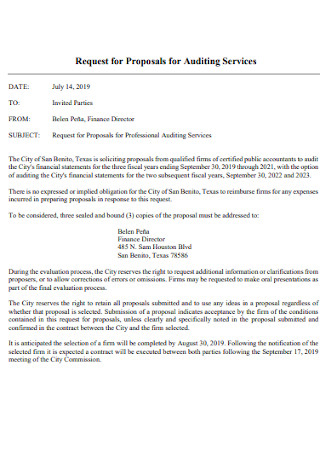
Proposals for Auditing Services
download now -
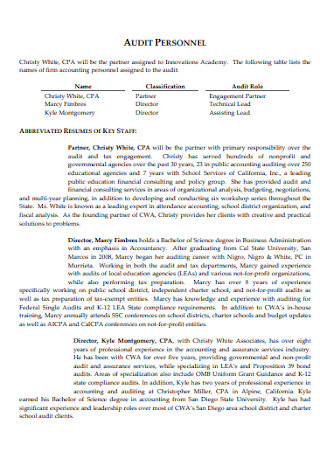
Personal Audit Proposal Template
download now -
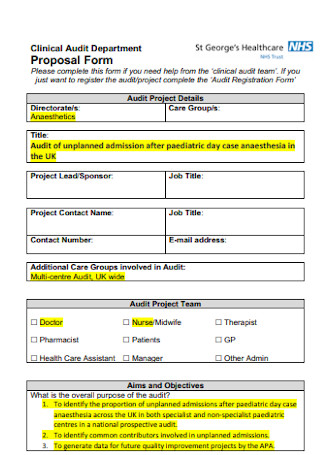
Client Audit Proposal Form
download now -
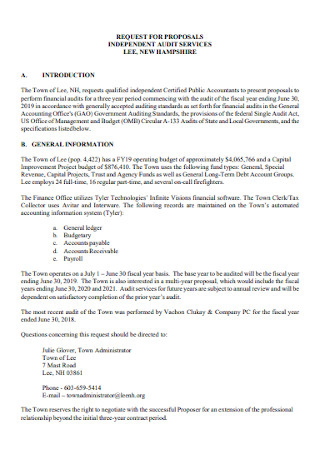
Independed Audit Proposal Template
download now -
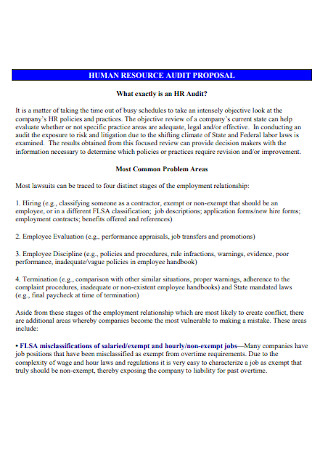
Human Resource Audit Proposal
download now -
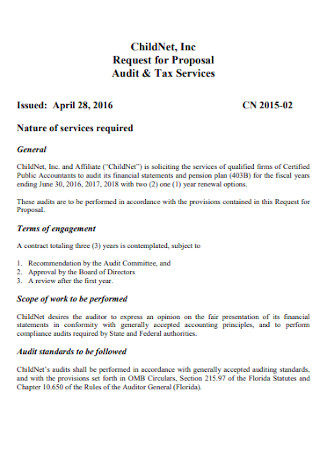
Audit and Tax Service Proposal
download now -
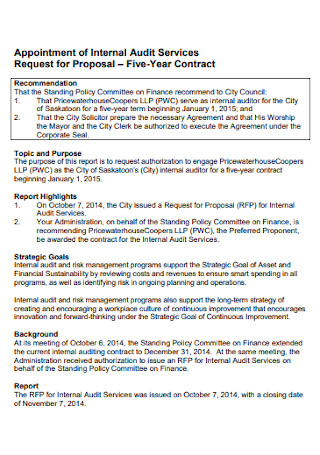
Appointment of Internal Audit Proposal
download now -
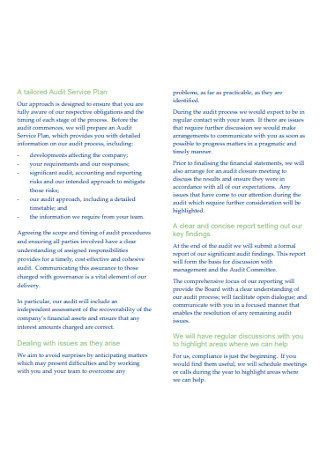
Audit Service Plan Proposal
download now -
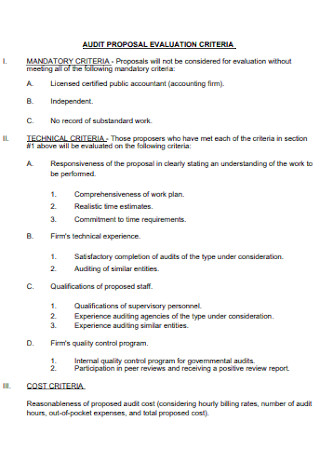
Audit Evaluation Proposal Template
download now -
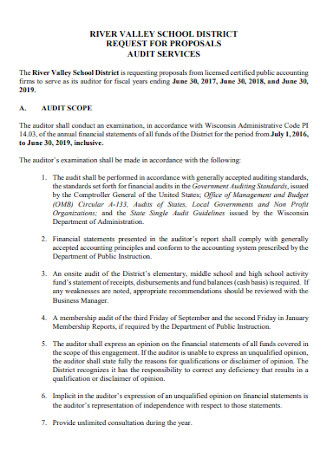
School Audit Proposal Template
download now -
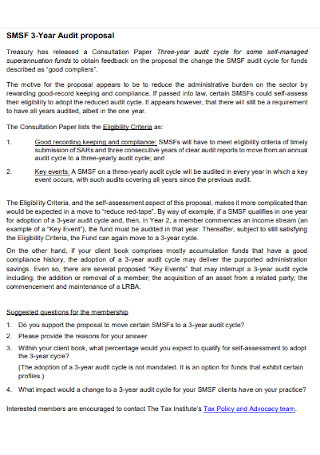
Year Audit Proposal Template
download now -
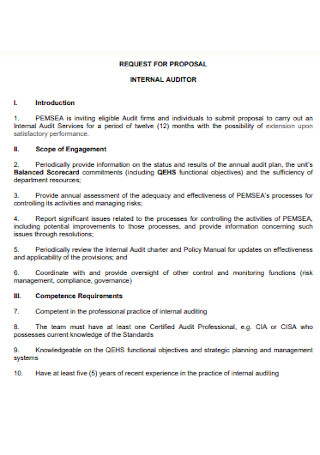
Internal Audit Proposal
download now -
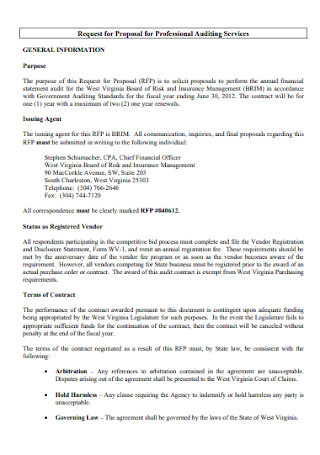
Professional Auditing Proposal Template
download now -
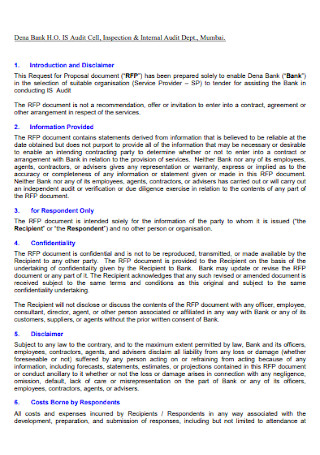
Audit Inspection Proposal
download now -
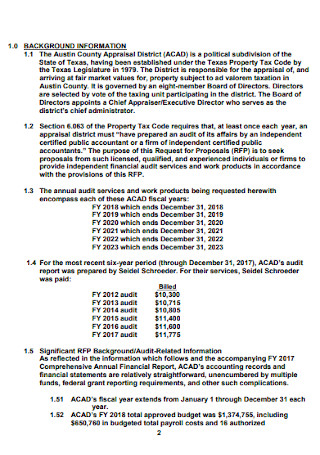
Financial Audit Proposal Template
download now -
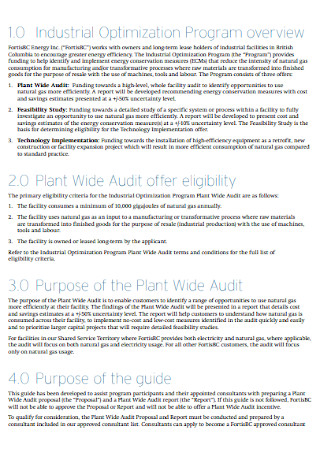
Plant Wide Audit Proposal
download now -
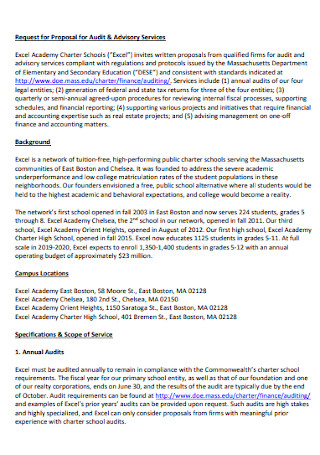
Audit and Advisory Proposal
download now -
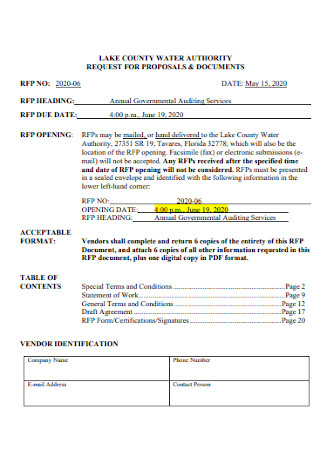
Audit Documents Proposal Template
download now -
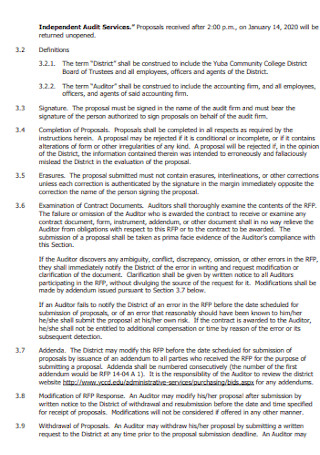
Independent Audit Service Proposal
download now -
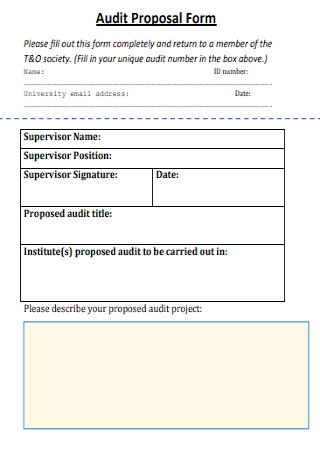
Audit Proposal Form Template
download now -
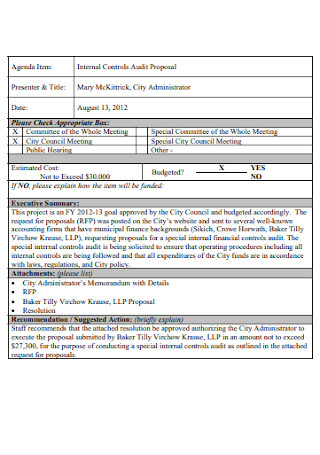
Internal Controls Audit Proposal
download now -
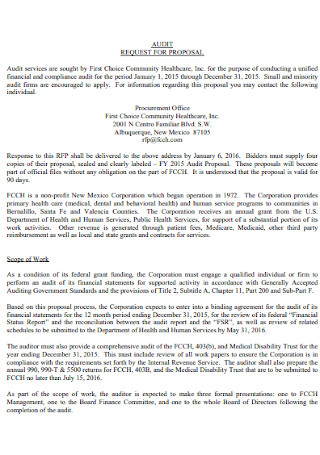
Sample Office Audit Proposal
download now -
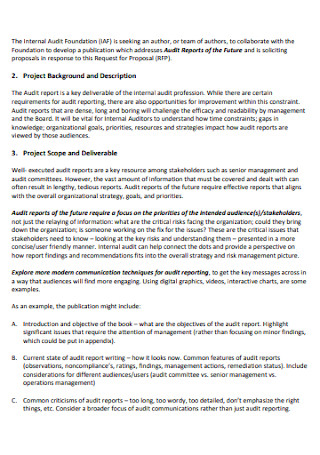
Project Audit Proposal Template
download now -
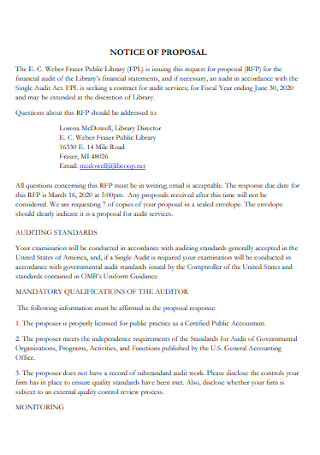
Audit Notice of Proposal
download now -
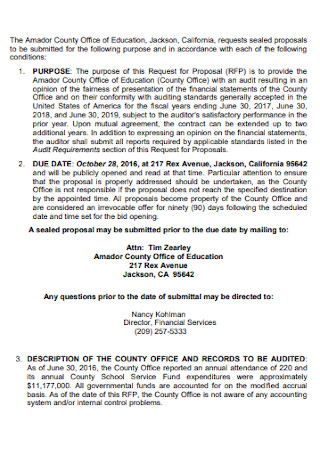
Annual Audit Proposal Template
download now -
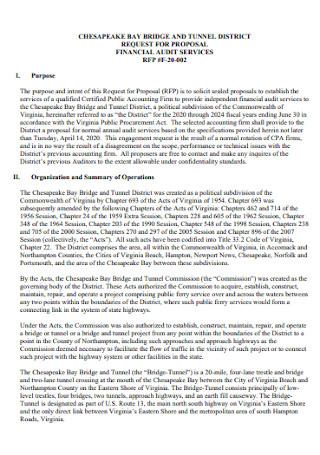
Financial Audit Service Proposal Template
download now -
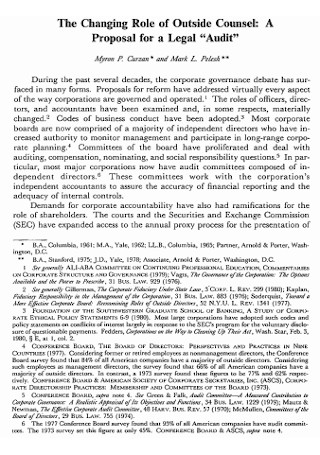
Legal Account Proposal Template
download now
FREE Audit Proposal s to Download
29+ Sample Audit Proposals
What Is an Audit Proposal?
Why Are Audit Proposals Important in Business?
The Standard Elements of an Audit Proposal
Internal Audit Proposal vs. External Audit Proposal
How to Make a Proper Audit Proposal
FAQs
How long is an average audit proposal?
What should I include in my audit proposal?
What are the different types of audits?
What are the four main phases of an audit?
What Is an Audit Proposal?
An audit proposal refers to a formal business document prepared by auditors, and it is sent to prospects so they get an idea of what to expect from the auditing firm once hired. This proposal contains the name of the auditors, pricing information, testimonials, the scope of work, and so much more. And the main goal of audit proposals is to convince potential clients why they should hire the auditors.
According to Statista’s 2021 research survey, auditing companies known as the Big Four (EY, KPMG, Deloitte, and PwC) totaled revenue of up to $167 billion.
Why Are Audit Proposals Important in Business?
In the world of business, ironically, the term “easy money” is hard to earn. And coming up with audits is one of the most important ways to make sure the business runs successfully and continuously. So if you’re wondering why you should concert yourself into making a splendid audit proposal, here are the top answers:
Answers the Frequently Asked Questions
Like a detailed letter, an audit proposal contains loads of important information about the auditing firm. Audit proposals tackle frequently asked questions such as the audit characteristics, the risks of the project, the reasons to conduct each process, the expected timeframe, the pricing info, etc. So that you can save time in catering questions from interested clients, simply hand them a copy of the audit proposal since the crucial details are inside.
Markets Your Auditing Business
Don’t forget that making an audit proposal for your auditing company can help bring a good light to your brand. Leverage the proposal as part of your marketing plan until more clients would know about your services. The best way to do that is to include your advantages, business logo, and client testimonials inside the audit proposal.
Reminds Prospects of the Benefits of Auditing
Auditing alone is beneficial for any business, and that is something you should open up for prospects in the audit proposal. A business owner may be adamant about not hiring an auditor. But if you remind this client about the importance of an audit plan and what the harmful effects would be without auditing, this will bring you a big chance of being hired.
Provides Written Documentation
Instead of proposing an audit service by word of mouth, it is much better when the deal is written in a document. Similar to signing an audit contract or agreement, writing a proposal is just as crucial so that the deal proceeds as planned before any party decides to change one’s mind. Most importantly, the audit proposal itself is proof that a new business ensues later on.
Responds to a Request for Proposal
Oftentimes, creating an audit proposal is necessary to respond to a client or organization’s request for proposal. So while running an audit firm, expect certain people to ask for a formal proposal from you. And this is where an audit proposal comes into play, which would be worth it if you prepared it meticulously.
The Standard Elements of an Audit Proposal
You’ll convince prospects that your audit company is the real deal when the critical details are inside the audit proposal. So what exactly are these details? These are the basic elements that you should insert in your audit proposal:
Internal Audit Proposal vs. External Audit Proposal
When auditors hand out audit proposals to prospects, there are two main types of audit proposals to consider. These are the internal and external audit proposals. And here is a quick guide on how to differentiate an internal audit proposal from an external audit proposal:
Internal Audit Proposal
From the name itself, an internal audit proposal concerns the internal processes of a company. This includes the business finances, accounting procedures, risks, and other management concerns. The manager typically asks for an internal audit proposal so their accountants run through a formal audit assessment.
External Audit Proposal
External auditors don’t have to be part of the organization to assess. External auditing continues to recheck the financials covered by an existing business report. Since they are mostly commissioned by particular shareholders, external auditors are independent. And whether an audit service focuses on internal or external audit, it helps to clarify that in the audit proposal.
How to Make a Proper Audit Proposal
After that thorough guide regarding the audit proposal’s definition, importance, elements, and types, writing the audit proposal itself would be easy. And it even gets easier with sample audit proposal templates to assist you in the process. So without further ado, follow these steps on how to create an audit proposal:
Step 1: Conduct a Business Analysis or Review
How well do you know your audit company or your service as an independent auditor? Review your entire craft first with a business analysis so that you’ll get a refresher about what you can do, how much your services cost, and other striking details to write in the audit proposal. After your review, making the audit proposal, later on, would be easy rather than still trying to figure out what set of information should be part of the proposal or not.
Step 2: Get Free Layouts from Sample Audit Proposals
There’s no need to bother yourself with creating audit proposals from scratch. You’ll get free layouts and formats using the sample audit proposal templates in this article. Just click on your preferred audit proposal sample, edit the details inside, and print or publish your work shortly. The best part about editable samples is that you can personalize them until they look professional, original, and well-made. Customize a template now!
Step 3: Outline the Elements of an Audit Proposal
Recall the audit proposal’s elements, as discussed earlier. You need the title, project description, and more. Don’t forget the acceptance section since that part confirms if a client agrees to hire you or not. The key is to be as detailed as possible such as mentioning the complete budget plan in the pricing info or explaining the technical terms mentioned in the project description. And most importantly, organize the flow of your presentation wherein there is a smooth transition in moving from one element to another.
Step 4: Observe a Professional Tone
Bear in mind that the audit proposal is still a formal business proposal. So be serious in talking about the auditing business to get respect from your prospects. Another tip is to be straightforward with the details. Proposals that have so many pages may irk various clients, especially when not all prospects have all the time in the world to read lengthy proposals. Be direct to the point and make sure the message is easy to comprehend.
Step 5: Tailor the Details
Lastly, tailor the content of your proposal according to your prospects. This tip improves your communication in dealing with clients because no client wants to receive a carbon copy of an audit proposal. Personalize it by mentioning your work experience that is relevant to your client and they would much appreciate that for taking the effort to tailor it to them. Then, submit the proposal pronto.
FAQs
How long is an average audit proposal?
Audit proposals vary in how many pages they have but usually, they range from nine to 19 pages.
What should I include in my audit proposal?
Insert the elements of an audit proposal mentioned earlier and you may add other relevant information such as an introductory statement, employees’ education, notes, and a closing statement.
What are the different types of audits?
Besides the internal and external audits, there are also financial statement audits, performance audits, employee benefit plan audits, operational audits, compliance audits, single audits, information system audits, forensic audits, brand audits, and payroll audits.
What are the four main phases of an audit?
These are the planning or overview, fieldwork, audit report, and follow-up review.
Auditing as a business is no joke. In fact, auditing companies such as the Big Four generated up to $167 billion in revenue in 2021. And you value this professional service just as you value how much you could earn from it by making sure you already have an audit proposal for clients. Leverage the free premade audit proposal samples in this post now!
